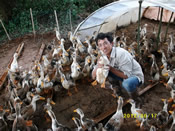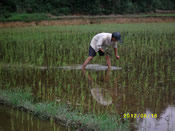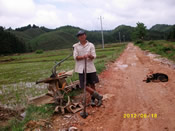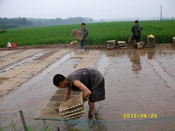By Yao Huifeng (Young rural returnee, intern of CSA Internship Programme 2011)
Editor’s note: For many people, to be a farmer is to be a loser. Farmers urge their children to study hard in order to leave for a better life in the city. While this is what most people think, in recent years there is a counter current in Mainland China. One after another, a group of intellectuals graduating from universities have given up what most people think are opportunities to escape poverty and become wealthy. In pursuit of a dream of rural life, they go home to practise farming. What make them make such a decision? What inner struggles have they gone through? What is their experience when they go home to do farming? How do they face the objections of their families and the incomprehension of other people? What kind of life values do their decisions affirm?
In this issue, we have invited two young rural returnees, Yao Huifeng and Wang Ning, to write about their experience and their reflection. Both of them are determined to practise organic farming and take part in Community Supported Agriculture (CSA) as a means to market their products. It has been an arduous but fruitful process. For example, the yield of paddy rice grown by Yao is low because he practises ecological farming, but he is able to sell them at a higher price because it is marketed through CSA. Yao is able to earn as much as a conventional farmer. Wang Ning has had a hard time running CSA, but after three years, 40 families are now willing to pay in advance for a year of vegetable supply. This shows that returning to the countryside does not necessarily mean a dim future. Let’s read what the two young people have to share with us.
 Located in Yifeng County at Yichun City in Jiangxi Province, my village is a beautiful mountain village with picturesque sceneries like those in the south of Yangtze River. My best memories belong here. In Spring we would pick all kinds of flowers and put them in the vase at home. I always remember the azalea that blossoms all over the mountain. Red, yellow, blue…all so beautiful. In summer, I would go with my little friends to graze the cows. Once the cows were grazing on the hills, we would go and play in the clear stream fishing and catching shrimps. In autumn, there were wild fruits all over the hills: chestnut, pear, persimmon and many other wild fruits with names of which we did not know. In those days we did not have snacks but we were content with wild fruits. In winter, we ran in the snow, fought battles with snow and made snowman. The whole village was filled with laughter. My childhood life in the village is deeply carved into my mind.
Located in Yifeng County at Yichun City in Jiangxi Province, my village is a beautiful mountain village with picturesque sceneries like those in the south of Yangtze River. My best memories belong here. In Spring we would pick all kinds of flowers and put them in the vase at home. I always remember the azalea that blossoms all over the mountain. Red, yellow, blue…all so beautiful. In summer, I would go with my little friends to graze the cows. Once the cows were grazing on the hills, we would go and play in the clear stream fishing and catching shrimps. In autumn, there were wild fruits all over the hills: chestnut, pear, persimmon and many other wild fruits with names of which we did not know. In those days we did not have snacks but we were content with wild fruits. In winter, we ran in the snow, fought battles with snow and made snowman. The whole village was filled with laughter. My childhood life in the village is deeply carved into my mind.
The lost city life
As I grew up I began to help with farming tasks. In those days, everything was done manually: plowing, transplanting seedlings, weeding, harvesting the rice, etc. The busy farming season lasted for a month. In hot summer, it was really hard. Because of this, since we were small, our parents told us to study hard. We were told that we would not have to do farming anymore once we leave the village. Study becomes the only means for rural children to leave. When we began to attend school, we went farther and farther away from our home and from our land. However, every time I went home, I noticed that the rural area was changing. Someone uses a plowing machine, a harvester, weeding chemical or chemical fertiliser, etc. I was glad. Farming was not as arduous as before. However, I also noticed that the stream was not as clear as before and there was no more fish in it. The vegetables and fruits lost the taste that we remembered from childhood and more people were getting sick. I believed that this was normal.
Then I went to Kunming for university. Known as the City of Spring, Kunming is a beautiful city known for its mild climate throughout the year. After 4 years, I felt that life was too comfortable in Kunming and that a young person should venture into the unknown. I went to Beijing and stayed there for 3 years. The terrible sand storm, the traffic jam so bad that you stop losing your temper, the stifling grey sky, and a life so busy that you don’t have time to think at all. A life of the walking dead. So I went to Guangzhou. I stayed there for 3 years too. The same grey sky, the same traffic jam and the same life of the walking dead. I asked myself: “Is this my goal? Is this the life I want?” I was confused. I was desperately looking for a way out but could not find any. I could only continue to live a life that was like stagnant water—no goals, no purpose, only earning a living, so painful that I felt numb and so numb that I did not feel pain.
Making a decision to go home to make a change
Whenever I go home, when I walk on the village paths or stepping into the fields, I feel an indescribable tranquility and my mind feels at ease. Even though everything has changed beyond recognition, I love the landscape and every grass and tree here. I don’t know how it happened but I started wanting to do something for this land. Yet I could not find the way back. Although I had left the rural area, my heart was always there. I always watched the programme on agriculture and rural area on CCTV-7. In 2010, when I watched a programme on how to become rich, I learnt about CSA. It was the first time I heard of the concept. I felt I saw light. This is precisely what I want to do. To find out more about CSA, I looked up organisations working on CSA in Guangzhou. I found Nurture Land, an organisation that practices CSA. I got in touch with Guan Hui and could not wait to meet up with him. Guan Hui told me about the internship programme supported by PCD. After thinking for half a month, I resigned from the job that I had done for 5 years and became a CSA intern.
My purpose in becoming an intern was to learn organic farming and the CSA model so that I could return to my village to do something. During the one-year learning, I learnt about the severity of the food problem—ractopamine-fed pork, melamine-tainted milk, fruits grown with growth accelerating chemicals, vegetables contaminated with pesticide residues, waxed rice, etc. If there is no guarantee for what one eats, one cannot speak of happiness, I thought. I began to understand why my cousins at home were getting all sorts of strange illnesses. Pesticides and chemical fertilisers have been used for a few decades and the land as well as human bodies are terribly polluted. I was more determined to go home after I learnt of all these problems. During my internship, I immersed myself in reading about organic farming and visited many organic farms. Gradually my knowledge of organic farming grew and I was able to master the knowledge. I must thank Guan Hui for the selfless support he showed me. During this period of time, he was always trying to help me and did his best to meet my needs. I returned home in September 2011 when my internship came to an end.
Returning home to do farming: a long and difficult road
When I was home, my parents objected to my decision strongly. First, they had painstakingly supported me through university because they had not wanted me to become a farmer. They could not accept the fact that I came home to become a farmer. Second, most farmers think that working in the farm is the most strenuous work and it is for losers. If, after I had studied in the university, I came home to work in the farm, it was a loss of face for them. My father has not talked with me much since I came home. My mother continues to nag and complain. Other villagers are also making all sorts of comment. I did not anticipate that my return would create a commotion among so many people. This is the first time for them to see a university graduate coming home to become a farmer. They are amazed and concerned and give all sorts of reasons for my decision. Because of this, for a long time I did not dare to appear in crowded places. Whenever I passed by the village entrance, I walked by quickly as though I was escaping and dared not look at anyone. Even though I had prepared for this, sometimes I felt suffocated and became doubtful. I asked myself if I had made the right decision by coming home. However, considering the meaning of all these helped me pull myself together again.
I have cultivated 28 mu of land and am doing organic duck-rice farming. I want to first do a good job myself before I lead others in practicing organic farming. I think I must try everything first to find out the gist. The first time I plowed, the machine overturned three times. Blood blisters were all over my hands. This was the cost I paid for learning to plow. With the help of my parents I learned to sow for three seasons of practice. I tried many things for the first time and I had a lot of failures. I explored different things as I practiced. I have become a genuine farmer after a year. In the course of learning I failed many times and the pressure was immense. Farming is hard work but I have never thought of giving up. It is my goal and it is what I enjoy doing. I will never give up also because of its meaning for me. I hope that more farmers would join in doing organic farming to earn more income, improve the environment and their life, and to provide urban dwellers with healthy food. Only when we could eat without being worried could we say that we have a happy life. I want to thank Nurture Land for their support. They buy the organic rice I produce. It is thanks to their help that I am able to get on the road home so soon.
I am now home for a year. This is only the beginning. The road ahead is long but I am not lonely because there are many friends with the same mission paying great effort to achieve their goal and I also have many friends who encourage me and help me. I am always on the road.





